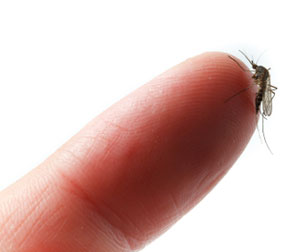Tiny Mosquito
Dangers of the Culex Mosquito
The Culex mosquito, better known as the common house mosquito, is one
of the three major types of mosquito inhabiting the planet. Since it typically
obtains its blood meal from birds instead of humans, it is not considered
as much of a threat to our health as the Anopheles and Aedes mosquitoes.
Nevertheless, the Culex remains a vector for an assortment of diseases
that can be potentially fatal to humans.
 Quick Facts about the Culex Mosquito
Quick Facts about the Culex Mosquito
- It lives from 10 to 14 days
- Its bite is itchy and can be painful
- It is a weak flier
- It prefers to bite at dawn or after dusk
- It has a blunt tip on its abdomen
The Life Cycle of the Culex Mosquito
The
male Culex mosquito feeds solely on plant nectar during its brief existence;
on the other hand, the female Culex requires a blood meal to properly
nourish her eggs before she lays them. The eggs are laid on the surface
of standing water, in places where there are no signs of plant life. Items
that can collect rain water on your property, such as tin cans, garden
pots, used tires, rain barrels, children’s pools, etc., are ideal
receptacles for breeding. The female deposits between 100 to 300 eggs,
one at a time. They will hatch two days later.
The Culex larva will live in the water for approximately one to two weeks, coming up to the surface occasionally for oxygen. When it enters the pupa phase, it will float on top of the water from one to four days, resting until it ultimately transforms into an adult mosquito.
Once an adult, the Culex mosquito will remain stationary on the water’s surface until its body is fully hardened and its wings are dry and ready for flight. The female mosquito will then find a mate, feed on blood, and lay its eggs. And so, the process repeats itself.
Diseases Spread by the Culex Mosquito
Although the Culex mosquito is not a primary vector for prevalent mosquito-borne diseases such as malaria, dengue and yellow fever, it can transmit a number of other illnesses that can present serious health problems to human beings. It is known to contribute to the spreading of the West Nile Virus, filariasis, and encephalitis.
To lower the likelihood of disease, remove all objects on your property that collect rain water, and protect yourself from bites by applying mosquito repellent to your clothes and the exposed areas of your body when venturing outdoors, especially at dawn and dusk.
Home - Mosquitoes - Bites - Control - Diseases - Resources - Site Map